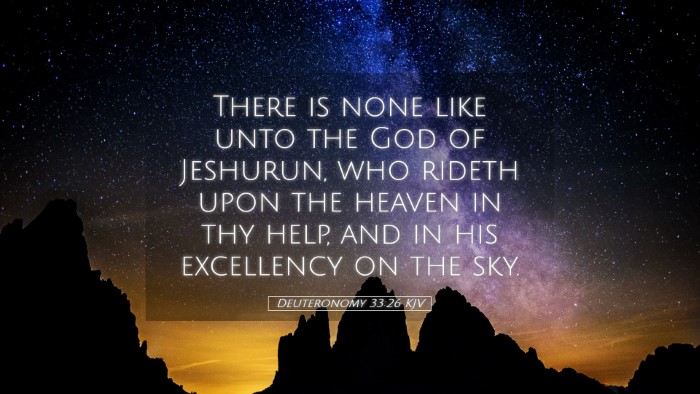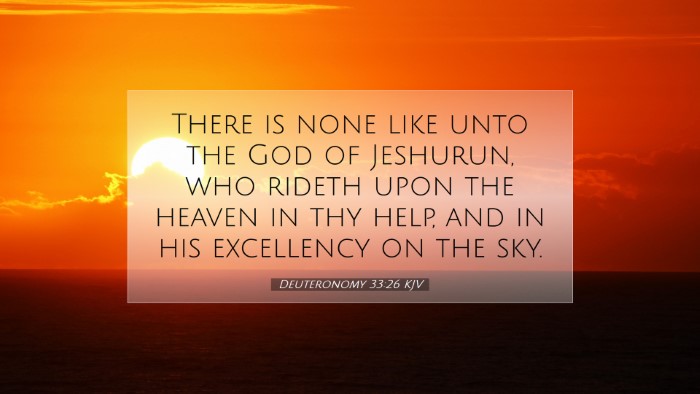Commentary on Deuteronomy 33:26
Bible Verse: “There is none like unto the God of Jeshurun, who rideth upon the heaven in thy help, and in his excellency on the sky.”
Introduction
Deuteronomy 33:26 encapsulates profound theological truths about the nature of God and His relationship with His people, as highlighted in public domain commentaries by Matthew Henry, Albert Barnes, and Adam Clarke. This verse is situated within Moses’ farewell blessing to the tribes of Israel, serving as a reminder of their unique relationship with God. The following commentary will explore the key themes presented in this verse, emphasizing the uniqueness of God, His providence, and His majestic sovereignty.
The Uniqueness of God
“There is none like unto the God of Jeshurun.” This phrase emphasizes the unparalleled nature of the God of Israel. According to Matthew Henry, “God is matchless; there is no other god, no rival.” This assertion naturally draws on the historical context of Israel's worship, distinguishing Jehovah from the pagan deities surrounding them. In this regard, Albert Barnes elaborates that the name “Jeshurun” signifies Israel at its best—implying uprightness or faithfulness, thus highlighting God's unique favor and relationship with His chosen people.
Implications for Worship
The uniqueness of God establishes a foundation for Israel’s worship. Adam Clarke points out that since God is beyond comparison, the response of His people should be one of reverent worship and devotion. This understanding is crucial for contemporary worship as it invites modern believers to acknowledge God’s sovereignty and to engage in worship that reflects His glory.
God’s Help and Presence
“Who rideth upon the heaven in thy help.” This phrase illustrates God’s continual involvement in the lives of His people. Moses speaks of God riding upon the heavens, which evokes imagery of divine power and authority. Matthew Henry notes, “As a king rides forth to help his subjects, so does God assist His people.” The metaphor conveys not only God’s omnipotence but also His readiness to intervene on behalf of His people.
The Assurance of Divine Assistance
This assistance is not passive; rather, it implies a personal engagement in their struggles. Barnes emphasizes that God’s help is ever-present: “In all their distresses, they may count upon His support.” This assurance serves as a comfort to believers today, reassuring them that God is actively involved in their trials, providing both strength and guidance. The theological principle here is that divine presence is a source of strength for believers, affirming that they do not face challenges alone.
The Majesty of God
“In his excellency on the sky.” The term “excellency” denotes God’s grandeur and majesty. Adam Clarke comments on this phrase by suggesting that it reflects God’s transcendent nature, wherein He is exalted above all creation. This excellence not only highlights His beauty and glory but also points to His sovereign rule over all things.
The Cosmic Sovereign
The imagery of God’s reign in the sky serves to remind believers of His sovereignty over the universe. According to Henry, “He is a great God, the great Creator, and the great Governor of all.” Such a perspective is vital for understanding how God's transcendent power intersects with His immanence. When pastors and theologians preach about God's majesty, they must communicate that He rules from a place of authority and has the power to enact His will in the world.
The Theological Implications
The declaration of God’s uniqueness, aid, and majesty carries profound theological implications. It invites believers into a deeper understanding of God’s nature and encourages a relationship built on trust and reverence. Each element of this verse can be expanded into practical theology and doctrine, urging students of Scripture to explore how these attributes of God inform faith and practice.
Encouragement for God’s People
This verse serves as an encouragement to God’s people, reminding them of their identity as the recipients of God’s covenant love. Barnes points out that the acknowledgment of God’s sovereignty should lead believers to live lives reflective of His grace and mercy. Moreover, knowing that they are under God’s care instills confidence in their daily lives, reinforcing the call to walk faithfully regardless of challenges.
Concluding Thoughts
Deuteronomy 33:26 offers a succinct yet profound affirmation of God’s character and His relationship with His people. Through exploring the insights of Matthew Henry, Albert Barnes, and Adam Clarke, we grasp a vision of God that is unique, sovereign, and intimately involved in the affairs of His people. For pastors, students, and theologians, this passage serves as a rich text for reflection, worship, and teaching, calling them to appreciate and proclaim the unparalleled nature of God.
Discussion Questions
- How does understanding the uniqueness of God influence our worship practices?
- In what ways can we experience God’s presence as a help in our daily lives?
- What does the majesty of God teach us about our place in creation?
- How can the truths in Deuteronomy 33:26 shape our understanding of God’s sovereignty?


